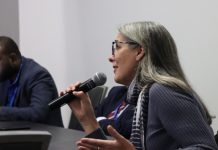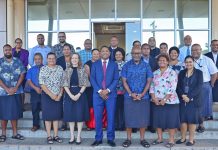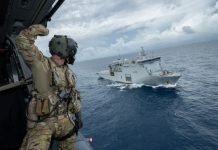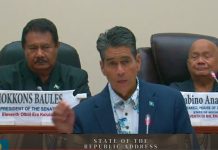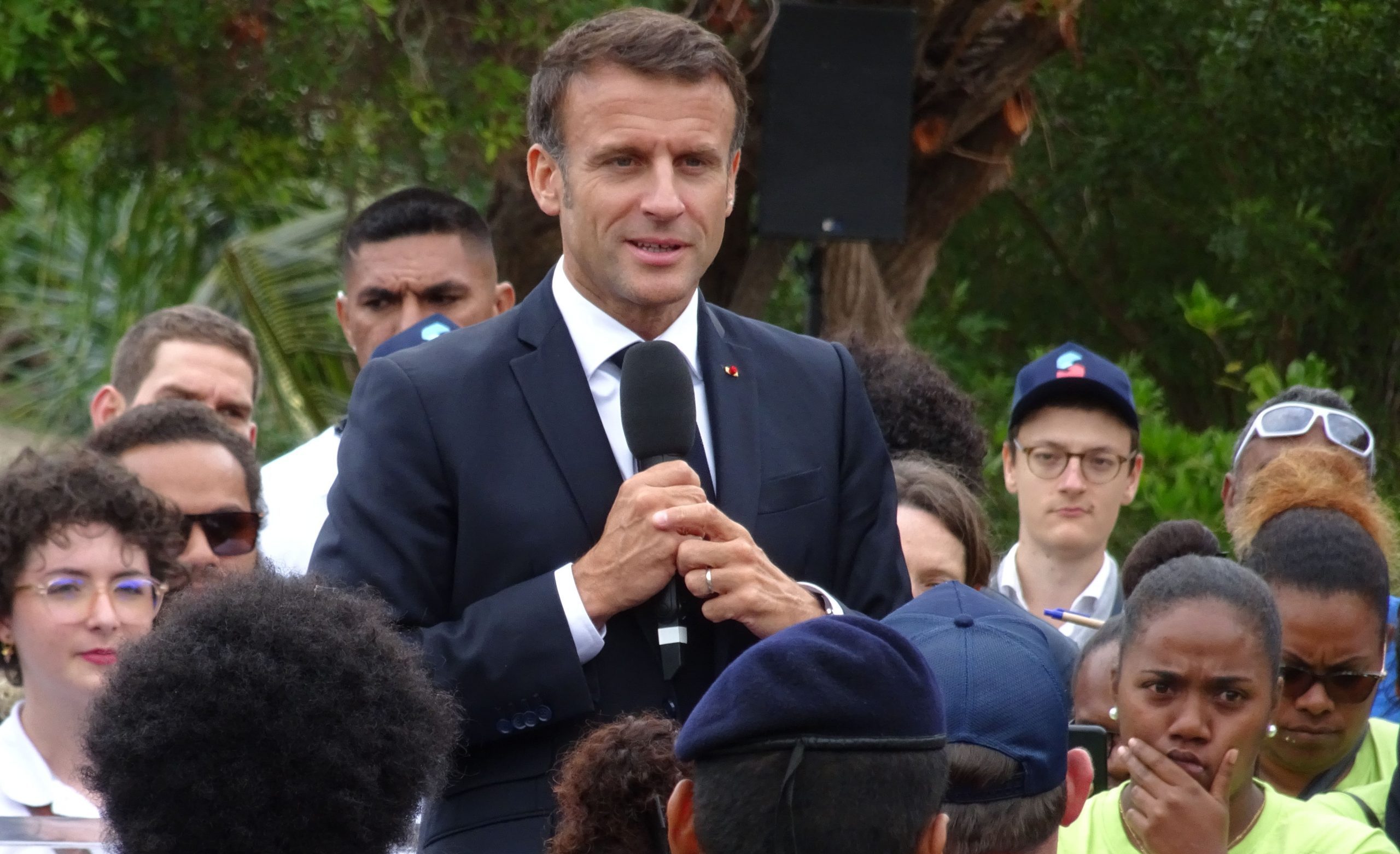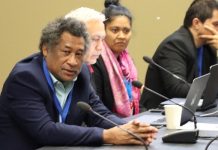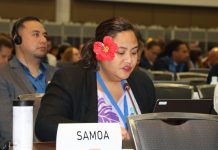By Nic Maclellan in Noumea
In a major speech in Noumea, French President Emmanuel Macron confirmed he would forge ahead to seek changes to the French Constitution in early 2024, to reform voting rights and create a new statute for New Caledonia within the French Republic.
Speaking before thousands of supporters in Noumea’s central square – many waving the bleu-blanc-rouge French tricolour – Macron said “New Caledonia is French because it has chosen to remain French” after three referendums on self-determination in the French Pacific dependency.
In the lengthy speech on 26 July, President Macron talked of building a new political status in New Caledonia through a “path of apology and a path of the future.”
For many indigenous Kanak and other independence supporters, Macron’s pledges of repentance and partnership rang hollow. Outside central Noumea, trade unionists and independence supporters rallied alongside a major road in Vallée du Tir, flying the flag of Kanaky and displaying banners criticising the president’s visit.
Macron’s speech was well received by most of the large crowd in the Place des Cocotiers. But as the echoes of cheers fade away, there remain crucial questions about the timetable for constitutional reform, first announced last year by Overseas Minister Gérald Darmanin. Beyond this, Macron faces political challenges at home to institute these reforms. His standing in opinion polls has tumbled in France, with mass protests and strikes against recent reforms of pensions and the retirement age, followed by rioting in cities across the country in June and early July after French police shot and killed a young man of Arab heritage.
After losing his overall majority in the French National Assembly in 2022 legislative elections, and reshuffling the French Cabinet just days before flying to the Pacific, Macron’s bold pledges need agreement amongst New Caledonian political leaders to implement on schedule.
Macron’s pledge for the future
During his speech, Macron’s pledges of partnership and respect for Kanak identity alternated with sharp challenges to independence leaders, pointed criticism of the rentier economy managed by New Caledonian elites and a clear determination to push through reforms that will advantage France’s colonial power in the Pacific.
Macron highlighted key pillars for change, including a programme of economic and social reform to address startling inequality in employment, education and welfare standards that has disadvantaged indigenous Kanak and workers from other communities. He spoke of new training and employment programmes for young people, and initiatives to bolster New Caledonia’s crucial economic sector, the mining and smelting of nickel ore.
The three nickel smelters in New Caledonia face tough economic times with rising energy costs that make them uncompetitive. Société Le Nickel (SLN) – part owned by the French State – is in dire economic straits and needs ongoing government financial support.
As Macron addressed political reform, he said that historic advances made under the 1988 Matignon-Oudinot Accords and the 1998 Noumea Accord should not be rolled back: “I say it here very clearly: there is no question here of going back on these achievements. They are our heritage from Matignon and Nouméa: the principle of the right to self-determination, local political institutions and New Caledonian citizenship.”
However, there was loud applause as he pledged to open up New Caledonia’s electoral rolls, to allow more French nationals to participate in May 2024 elections for three Provincial Assemblies and national Congress. Currently, residency restrictions mean that voting for these local political bodies is limited to New Caledonian citizens, rather than all French nationals.
Macron said that legally some elements of the Noumea Accord were transitional, and must now be revised after the completion of the three referendums between 2018-2021: “I think first of the electorate and voting rolls – and here I note that your representatives have all agreed to make a first step forward by ‘thawing’ the frozen electoral rolls for the 2024 provincial elections.”
During discussions between Overseas Minister Gerald Darmanin and local political leaders in April, parties agreed to investigate scenarios for a change to residency requirements that guarantee citizenship and voting rights. Conservative calls to completely open up electoral rolls to more than 40,000 resident French nationals have been fiercely resisted by the independence movement, but discussions in Paris next September will try to seek a compromise.
Alcide Ponga, acting President of the anti-independence Rassemblement party, told Islands Business that options vary, with the conservative Loyalist bloc favouring a three-year residency requirement, while the UNI parliamentary group had considered 10 years as part of a wider package of reforms.
“I think we may finish up at 10 years – it’s what people talked about way back in 1988,” Ponga said. “But we need to look beyond this issue. Citizenship means more than voting and it’s about how we work together.”
In turn, Victor Tutugoro of the Union Nationale pour l’Independance (UNI) – a key negotiator for the FLNKS – said that this issue could be studied in principle, but that “any compromise on the electoral roll must be part of a broader package of reforms, including guarantees on the right to self-determination.”
As yet, the FLNKS has not committed to any change, and there is a lively debate within and between different parties in the independence movement. Many grassroots activists and groups outside the FLNKS, including the USTKE trade union confederation and Parti Travailliste, remain hostile to compromise. Protesting during Macron’s visit, USTKE President Andre Forest said: “The electorate must remain as is, because it affects citizens of this country. It’s this very notion of citizenship that we want to retain.”
UNI’s Tutugoro said that for Kanak living in the tribes, “they always worry about the colonisation of the land. In the past they were chased from their land and their home. I’m one of many people who were chased from their home. The collective memory of this loss continues to affect how people react and this profoundly underlies their rejection of changes to the electorate.”
However, President Macron told local leaders that his government could not legally maintain the current electoral regime established by the Noumea Accord. He said any decision to change voting rights must be finalised at the September meeting in Paris, to allow enough time for constitutional reform before the May 2024 local elections. Beyond that, there is scope for negotiations of a new political statute to continue after May.
Roundtable boycott
Elements of this framework were discussed as President Macron held a roundtable for New Caledonian politicians at the French High Commission on Wednesday morning. Leaders from major anti-independence parties attended, including Sonia Backès (LRC), Nicolas Metzdorf (Generations NC), Alcide Ponga and Virginie Ruffenach (Rassemblement) and Philippe Gomès (Calédonie ensemble).
Several pro-independence leaders attended, including the President of New Caledonia Louis Mapou, Loyalty Islands President Jacques Lalie and members of the UNI parliamentary group. However, some key members of the FLNKS stayed away, including the President and Vice President of the Union Calédonienne (UC) party Daniel Goa and Gilbert Tyuienon, the President of New Caledonia’s Congress Roch Wamytan, RDO’s Aloisio Sako and Palika leader and President of the Northern Province Paul Neaoutyine.
In his speech just hours later, Macron was clearly displeased at the snub: “For those who weren’t there, I was personally hurt by their absence.” He went on in an angry tone to throw down a gauntlet: “I say to all – ‘No turning back! No wavering! No standing still!’”
Explain their absence, UC’s Roch Wamytan argued that France had not addressed longstanding FLNKS concerns about the credibility and legitimacy of the third vote on self-determination in December 2021, where turnout halved and independence supporters refused to participate.
He also stressed that FLNKS leaders have been mandated to join bilateral talks with Overseas Ministers Gerald Darmanin, rather than trilateral negotiations with the French State and Loyalist parties. For Wamytan, “that’s why we preferred, in this format, not to go to the negotiation [at the High Commission]. We considered that it was a trilateral meeting. For the moment, because we have lost confidence in this government and in the President of the Republic, we abstained.”
FLNKS members have also complained that Sonia Backès, President of the Southern Province and leader of the anti-independence Loyalist bloc, is concurrently serving as Minister of Citizenship in the current French government.
In contrast, the leader of the anti-independence Rassemblement party, Alcide Ponga welcomed the outcome of the roundtable and the very fact that President Macron turned up, five years after his last visit to Noumea.
“Beyond the speech he gave and the messages he shared at the roundtable, he was here,” Ponga said. “This trip has been a key part of the process to go beyond the Noumea Accord. A key message was that we must move forward – we owe it to New Caledonians and to history. A second key message was that he saw New Caledonia as a partner of France in the Indo-Pacific – it’s an important idea that we New Caledonians must seize.”
Despite this, relationships with key French interlocutors have not been helped by a Cabinet reshuffle in Paris just days before the Macron tour, which saw the sacking of assistant minister for overseas affairs Jean-François Carenco. Carenco has kickstarted talks with the FLNKS in 2022, but now he’s gone, replaced by Philippe Vigier, the Vice President of the Mouvement démocrate (MoDem).
French media argue that this appointment is driven by domestic politics more than the interests of people in French overseas dependencies. The MoDem are a coalition partner with Macron’s Renaissance party in the National Assembly – and the President is shoring up alliances as his standing falls in public opinion polls.
Military build up
After two days in New Caledonia, President Macron travelled to Vanuatu and Papua New Guinea, before flying home with a stopover in Sri Lanka.
Moving from Noumea to Port Vila and Port Moresby, the French President was accompanied by President Louis Mapou of New Caledonia and President Moetai Brotherson of French Polynesia, both pro-independence leaders who could facilitate dialogue with other Forum island countries.
Macron’s Pacific tour has highlighted his vision of France as a regional power, an alternative to Chinese influence, but also in part to France’s Anglosphere partners (the September 2021 AUKUS announcement has left significant bruises on French pride after the sinking of a $90 billion (US$60 billion) Australia-France submarine contract, despite the Australian government’s current efforts to rebuild ties).
A key focus of Macron’s speech was his vision of New Caledonia as a base for the projection of French power in the Indo-Pacific region. He lauded the Forces Armées de la Nouvelle-Calédonie (FANC), saying military forces based in New Caledonia are “the foundation of our defence, of the protection of our territory, our seas, our airspace. They allow us to act alongside great allies and partners.”
France has currently deployed high-tech French Rafale fighter aircraft to the region under Operation Pegasus 2023, a based a modern OPV patrol boat in Noumea. However, many French defence analysts have questioned whether the ageing military vessels and aircraft currently in the region play a significant role beyond vital work in humanitarian and disaster response.
Surveying Marcon’s visit, Celine Pajon of the French Institute of International Relations (IFRI) noted: “AUKUS exposed the limitations and contradictions of France’s balancing act, seeking to provide an alternative to the choices imposed by the China-US rivalry. Paris indeed lacks both the military capabilities and diplomatic weight required to play such a role.”
Noting France’s modest diplomatic footprint in the region, Pajon argued “this posture of ‘balancing power’ in reality confines France within the grip of China-US rivalry and complicates its efforts to exert influence, promote its interests, and establish regional partnerships.”
Recognising this weakness, Macron’s speech pledged further military deployments to New Caledonia: “More than 200 additional soldiers and 18 billion francs [A$246 million] in investments directed here. It shows that our desire for independence and sovereignty is also at stake here, for New Caledonia and France, united!”
Arguing that “France is an Indo-Pacific power and yes, New Caledonia is a powerful partner for all neighbours in the region,” Macron also pledged to build a military academy in Noumea to train troops from neighbouring countries.
Such calls worry Pacific civil society worried about regional militarisation and the diversion of scare development funds. For Kanak activists, the deployment of more military forces to New Caledonia raises questions about France’s commitments to its obligations as an administering power. The UN General Assembly and UN Special Committee on Decolonisation have long called on “administering Powers to terminate military activities and eliminate military bases in Non-Self-Governing Territories under their administration and provide alternative sources of livelihood for the peoples of those Territories.
SOURCE: ISLANDS BUSINESS/PACNEWS


